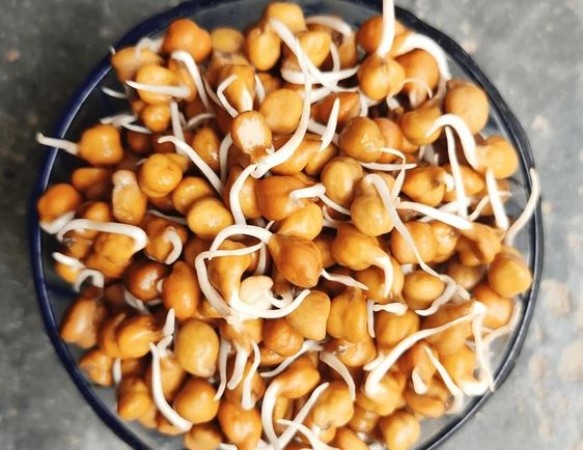
Chickpeas, commonly known as garbanzo beans, are a versatile legume packed with essential nutrients beneficial for overall health. They are a staple in various cuisines worldwide and can be prepared in numerous ways, including roasting and soaking. In this detailed analysis, we will delve into the health benefits of both roasted and soaked chickpeas, exploring their nutritional profiles, digestion, weight management, impact on specific health conditions, cognitive function, dental health, and cardiovascular benefits.
Nutritional Profile:
Chickpeas are a rich source of macronutrients such as protein, carbohydrates, and dietary fiber, as well as micronutrients including vitamins and minerals. Roasted chickpeas retain most of their nutritional content, offering significant amounts of protein, fiber, folate, iron, phosphorus, and manganese. On the other hand, soaked chickpeas are known for their higher content of B-vitamins and protein due to the sprouting process. These nutrients are essential for various bodily functions, including muscle growth, energy production, and cell repair.
Digestion and Gut Health:
The high fiber content in chickpeas, whether roasted or soaked, plays a crucial role in promoting digestive health. Fiber adds bulk to stool, facilitating regular bowel movements and preventing constipation. Additionally, chickpeas contain resistant starch, a type of fiber that acts as a prebiotic, nourishing beneficial gut bacteria and supporting a healthy gut microbiome. Soaked chickpeas, in particular, may be easier to digest due to the sprouting process, which activates enzymes that aid in digestion.
Weight Management:
Both roasted and soaked chickpeas can be beneficial for weight management due to their high protein and fiber content. Protein helps increase satiety and reduce appetite, leading to lower calorie intake. Fiber slows down digestion and promotes feelings of fullness, preventing overeating. Additionally, the complex carbohydrates in chickpeas provide sustained energy levels, reducing the likelihood of snacking on high-calorie foods. Incorporating chickpeas into meals can contribute to a balanced diet conducive to weight loss or maintenance.
Impact on Specific Health Conditions:
Individuals with certain health conditions may benefit from incorporating either roasted or soaked chickpeas into their diets. Roasted chickpeas, for example, are suitable for individuals with diabetes or thyroid disorders due to their lower carbohydrate content and potential thyroid-suppressive effects of roasting. Conversely, soaked chickpeas are recommended for individuals with muscle weakness or those looking to build muscle mass due to their higher protein content and easier digestibility.
Cognitive Function:
The combination of nutrients in chickpeas, including vitamins, minerals, protein, and complex carbohydrates, can have a positive impact on cognitive function. B-vitamins, such as folate and vitamin B6 found in soaked chickpeas, play a crucial role in neurotransmitter synthesis and cognitive development. Protein provides amino acids necessary for neurotransmitter production, while carbohydrates supply glucose, the brain's primary fuel source. Regular consumption of chickpeas may enhance memory, concentration, and overall cognitive performance.
Dental Health:
Chickpeas, particularly soaked chickpeas, contribute to dental health due to their phosphorus content. Phosphorus is a vital mineral that strengthens tooth enamel and promotes dental hygiene. Additionally, the act of chewing chickpeas stimulates saliva production, which helps neutralize acids in the mouth and prevent tooth decay. Including chickpeas in a balanced diet alongside other tooth-friendly foods can support oral health and reduce the risk of dental problems.
Cardiovascular Benefits:
Both roasted and soaked chickpeas offer cardiovascular benefits attributed to their nutrient composition. The fiber content in chickpeas helps lower LDL (bad) cholesterol levels by binding to cholesterol in the digestive tract and promoting its excretion. Potassium, found in abundance in soaked chickpeas, plays a crucial role in regulating blood pressure and reducing the risk of hypertension and cardiovascular disease. Additionally, chickpeas contain phytonutrients such as flavonoids and polyphenols, which have antioxidant and anti-inflammatory properties, further supporting heart health.
Roasted and soaked chickpeas are nutritious foods with distinct health benefits. While roasted chickpeas are convenient for snacking and may be suitable for certain health conditions, soaked chickpeas offer higher nutrient content and enhanced digestibility. Incorporating both types of chickpeas into a balanced diet can provide a wide range of nutrients essential for overall health, including protein, fiber, vitamins, minerals, and phytonutrients. Whether enjoyed as a crunchy snack or a hearty salad ingredient, chickpeas are a versatile and wholesome addition to any diet.
Understand Why Regular Eye Checkups are Necessary After the Age of 3 Years